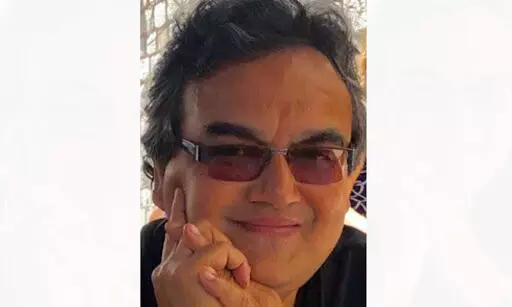Live
- Srikanth Avancha speaks on leadership, innovation, and risk management in IT services
- Munirathna Attacked in Bengaluru
- Centre Revives Coffee Development Plan to Aid Farmers- Goyal
- Sensational Crime Incidents in Andhra Pradesh and Telangana: 2024 Year in Review
- Tragic Loss for Beejady Village: Lance Havaldar Anoop Poojary Among Five Soldiers Killed in Poonch Accident
- Mass Rally Organized by BJP in Hyderabad on Atal Bihari Vajpayee's Centenary Celebration
- J&K: With over 25,000 houses built under PMAY, Doda ranks second in Jammu region
- Celta Vigo extend all-time club top-scorer Iago Aspas’ contract till 2026
- BGT: Kaif gives preference to Jaiswal-Rahul opening pair for Boxing Day Test against Australia
- Odisha CM Majhi, Naveen Patnaik extend Christmas greetings
Just In
'I Did Not Choose Poetry, Poetry Chose Me': Sudeep Sen


It is probably for the first time that an Indian publisher has honoured literary dialogues on a contemporary Indian poet writing in English without eclipsing his aura as a creative artist
Sudeep Sen: Selected Conversations and Interviews— Volume 1 of a three-volume omnibus — archives an important selection of interviews, over 30 years, with the internationally acclaimed poet. Volume 2 will include 'critical essays and reviews' on his work, and Volume 3 Sen's own 'non-fiction critical and creative essays'. Volume 1 carries twenty-seveninterviews by eminent academics/critics: Ziaul Karim, Akshaya Kumar, Agnes Lam, DoinaIoanid,Catherine Woodward, Dolores Herrero, Nathalie Handal, and others.It is probably for the first time that an Indian publisher has honoured literary dialogues on a contemporary Indian poet writing in English without eclipsing his aura as a creative artist.The title maybe slightly misleading:the book is about poetry in Sudeep Sen and not Sudeep Sen in poetry. The interviews are peppered with Sen's subtle sense of humour,irony, intelligence, story-telling skills, frank confessions and denials that rarely appear in Sen's otherwise serious, poised and objective poetry.
A beautiful cover-photo (of Udaipur's 'Saheliyonki Bari') by the poet is only one-third of the visual triptych. Once all three volumes are placed side-by-side, the full frame will reveal itself. The frontispiece image, a candid black-and-white of the young Sen in 1989during his Columbia University graduation ceremony, taken by novelist Amitav Ghosh—ushersthe reader into a world where prose lights up the intricate caverns of poetry. The book is aptly dedicated to the Nobel Prize laureate Derek Walcott, one of Sen's significant mentors.
In the interview with Agnes Lam, Sen paints a vivid description of a Manhattanreading where he unknowingly met another Nobel laureate, Joseph Brodsky(p.172-173).The narration is memorable and intimate;also due to Lam's tender yet,insistent questions. Ziaul Karim's interview engages Sen in detailed discussions where both dissect with precision,differences between prose and poetry(p.15-65). Karim creates a subtle tension,unravellingthe love between poetry and science, andthe influence of "fibre optics" on Sen's poetry in Fractals(London Magazine Editions, 2016).Romani an poet, DoinaIoanid, begins with a question often asked to Indian poets writing in English:"Why did you choose the English-language to express yourself?" Sen at once assures that English is one of his three "mother tongues" (p.135). Ioanidfurther nudges Sen to critique his own work, both as a poet and a reader.Parul,a journalist,explores the scope of translation and poetry, digging deep through manuscript-photographs in Sen'swork,Kaifi Azmi: Poems | Nazms(Bloomsbury) (p.314). In the final piece by Sreemathy Bhat, Sen talks about the cultural significance of poetry and protest, as in Delhi's"ShaheenBagh"(p.328).
The book, bothchic and aspirational, makes a notable contribution to literary criticism in India; and will beuseful for scholars and researchers. Some interviews are reminiscent of those inThe Paris Review'Writers at Work' series. Limited space,however, is given to the interviewers whose analyses and pertinent questions have madethe book claim its critical space.Engaging archival photographs and facsimiles would have been a refreshing addition.
At Kolkata's book-launch,on beingasked,whySen agreed to go with a small press when his other works are published by major international and Indian publishers, he said, "I have always supported younger writers and their sincere literary initiatives, something I've learnt from my mentors. So when 'Classix' enthusiastically approached me with conviction, agreed to my terms, paid an advance within hours of my signing— I didn'tsee why I shouldn't support them."'Classix'has paved the way for a discursive literary genre that is almost non-existent in India. In times, when main stream publishers avoid poetry,it is laudablethat an independent onechooses to map a literary province whereinterviews and critical essays can be archived in a systematic and worthwhile manner.
Sudeep Sen;
Classix; `650

© 2024 Hyderabad Media House Limited/The Hans India. All rights reserved. Powered by hocalwire.com






